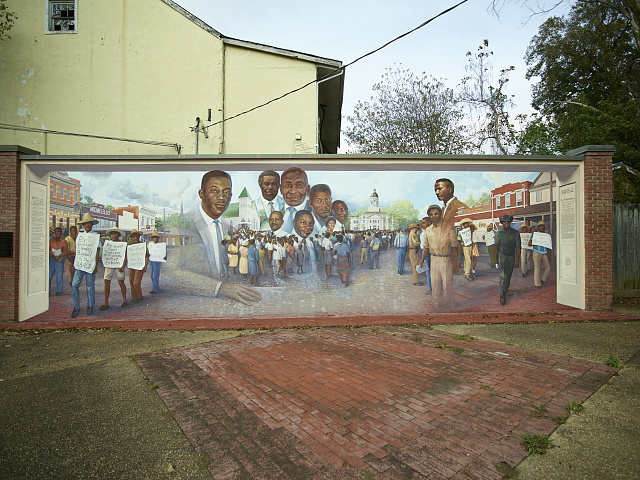In NAACP v. Claiborne Hardware Co., 458 U.S. 886 (1982), the Supreme Court ruled that an economic boycott constitutes a form of constitutionally protected expression akin to traditional means of communication, such as speaking and writing, even if violence is threatened as a means of achieving group goals.
African Americans boycotted white merchants and threatened violence against those that broke the boycott
The controversy arose as a result of a boycott imposed by African Americans against white merchants (including those at Claiborne Hardware) in Claiborne County, Mississippi. The NAACP, under the leadership of Charles Evers (its field secretary in Mississippi), organized the boycott and allegedly threatened violence against those who broke the boycott. The Mississippi Supreme Court ruled “that the entire boycott was unlawful and that each of the 92 petitioners was liable for all of its economic consequences.” The U.S. Supreme Court unanimously reversed.
Court held that supporting a boycott is protected speech
The Court held that political expressions in support of a boycott constitute protected speech and that individuals exercising the right of association for lawful purposes cannot be penalized for their lawful conduct. When acts of violence are committed in conjunction with lawful expression, the Court continued, regulations must be sufficiently precise to impose damages only upon those who are guilty of wrongful conduct.
Stevens wrote that the speech had to incite imminent lawless action in order to be punishable
Justice John Paul Stevens, writing for the Court, explained: “For liability to be imposed by reason of association alone, it is necessary to establish that the group itself possessed unlawful goals and that the individual held a specific intent to further these illegal aims.” He cited Brandenburg v. Ohio (1969) to support the proposition that persuasion must be “directed to inciting or producing imminent lawless action” and “likely to incite or produce such action” in order to be punishable via criminal law. Furthermore, he observed that speech may encourage or even advocate lawless action, yet be unlikely to incite such action.
Justice William H. Rehnquist concurred without writing an opinion, and Justice Thurgood Marshall, given his long association with the NAACP, did not participate in the decision.
Lower courts have distinguished between advocacy and urging illegal action
Several subsequent lower court decisions have distinguished between advocacy and urging illegal action, claiming that the latter is unprotected by the First Amendment. For example, in Rice v. Paladin Enterprises (1997), the Fourth Circuit concluded that communications aiding and abetting the commission of a crime are unprotected by the First Amendment, the remoteness or imminence of the criminal activity notwithstanding. The Supreme Court denied review of that decision. The Court has also been careful to exempt economic boycotts with a political purpose from antitrust laws.
The Court’s ruling in NAACP v. Claiborne Hardware also extended the applicability of the “incitement to unlawful action” test developed in Brandenburg to civil and criminal cases. Thus, some speech inciting receivers to unlawful action has acquired First Amendment protection from civil and criminal liability.
This article was originally published in 2009. Richard A. “Tony” Parker is an Emeritus Professor of Speech Communication at Northern Arizona University. He is the editor of Speech on Trial: Communication Perspectives On Landmark Supreme Court Decisions which received the Franklyn S. Haiman Award for Distinguished Scholarship in Freedom of Expression from the National Communication Association in 1994.

